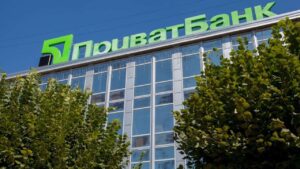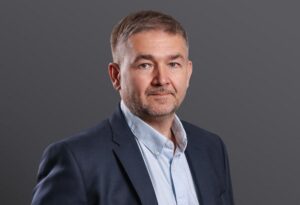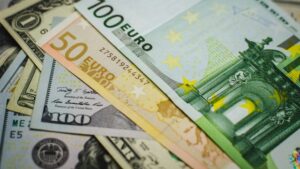
In 2025, state-owned PrivatBank (Kyiv) will put up for sale a portfolio of bad loans to individuals totaling more than UAH 5 billion.
“During 2025, PrivatBank plans to offer professional market participants a loan portfolio with a total debt of more than UAH 5 billion, which will include consumer loans granted to individuals without collateral,” the financial institution said on its Telegram channel on Monday.
It is noted that this refers exclusively to loans that are classified as “bad”.
Previously, the bank offered restructuring programs to borrowers and took all possible measures to repay the debt, including enforcement.
“Loans to military personnel, mobilized soldiers, and residents of territories where active hostilities are taking place or that are temporarily occupied will be excluded from the bad loan portfolios for sale,” PrivatBank said.
According to the National Bank of Ukraine, as of April 1, 2025, PrivatBank ranked first in terms of total assets – UAH 945.4 billion, or 25.2% among 61 banks.

“OTP Leasing, the largest leasing company in the Ukrainian market, has announced the launch of a new EUR20 million financing program for hybrids and electric cars in Ukraine with 10% cashback through a grant.
“We hope to sell this product in about 200 showrooms in Ukraine. I want to visit the largest ones in Kyiv and the main regional ones this year. Because we need to sell 20 million euros under this program and distribute 2 million euros in grants,” OTP Leasing CEO Andriy Pavlushin wrote on Facebook.
According to him, the program provides for the leasing of cars to legal entities with a breakdown of payments for three to four years and a wide range of models: from a small Citroen to a large Range Rover, and also covers “soft hybrids.”
The company’s CEO hopes that the program will be further enhanced by the opportunity for its participants to refund 20% VAT on hybrids.
He noted that OTP Leasing will conduct trainings for showroom salespeople and has started this work with VIDI Auto for Business, which covers such models as Suzuki, Toyota, Lexus, Peugeot, Nissan, Range Rover/Land Rover, Volvo, Ford, MG, and Jeep.
“OTP Leasing is a subsidiary of the Hungarian OTP Bank. According to the EBRD, the company with a leasing portfolio of about UAH 15 billion at the end of the third quarter of 2024 occupied about 40% of the Ukrainian market.
In the first quarter of 2025, OTP Leasing’s revenue decreased by 20.8% compared to the first quarter of 2024 to UAH 383.1 million, while net profit increased 2.3 times to UAH 346.0 million.

The Supervisory Board of NEC Ukrenergo has elected its chief dispatcher and board member Vitaliy Zaychenko as chairman of the board, according to Andriy Gerus, head of the Verkhovna Rada’s energy committee.
“Vitaliy Zaychenko has become the chairman of the board of Ukrenergo,” Gerus told the Energorforma internet portal on Monday.
The company has not yet officially announced the results of the Supervisory Board meeting, which was scheduled for Monday.
As reported, on June 13, the Ministry of Energy, as the sole shareholder of the company, made new amendments to the charter of NEC Ukrenergo. They allow for the appointment of the chairman of the company’s board of directors in several attempts, the last of which, the third, by a simple majority of the members of the supervisory board, and the first two by a qualified majority, i.e., at least five votes (there are seven members of the supervisory board, four of whom are independent). If the third attempt is also unsuccessful, the Supervisory Board shall decide to announce a new competition for the position of chairman of the management board. It must take place within 90 calendar days of the date of such decision.
The shortlist of candidates for the position of chairman of the board of Ukrenergo, based on the results of the competition announced on February 5, 2025, includes the acting head of the company, Alexei Brecht, its chief dispatcher and member of the board, Vitaly Zaychenko, and another representative of the company, Ivan Yurik, who deals with Eurobond issues.

On June 18, the President of Uzbekistan inspected the construction of the new Tashkent East Airport, one of the country’s strategic infrastructure projects.
Construction on the former military airfield started in 2017.
The future airport is positioned as a transportation hub for the capital and the New Tashkent under construction. Its main activities will be receiving official visits and business trips of foreign investors. It is expected that its opening will stimulate the development of the tourism industry in Tashkent region.
According to the presented master plan, the total area of the new air harbor will be 561 hectares. The passenger terminal will serve up to 100 people per hour. The airfield’s apron will be able to park 23 double-deck Boeing 747s simultaneously.
The first phase of work, including the renovation of a 4-kilometer runway, was completed in 2023.
The airfield is capable of handling aircraft of all classes, including the heaviest ones.
The construction of two terminals is underway to accommodate official delegations and business aviation, as well as a runway and hangars for aircraft maintenance. The airport will be equipped with modern ICAO Class III-A radio and meteorological equipment. It will become the first air hub in Central Asia with ICAO Category III-A, which will allow it to receive flights even in fog and zero visibility.
The renovation of Tashkent-East is aimed at creating a modern, convenient and safe air hub that will relieve the capital’s main international airport and increase the overall level of air traffic.
Thanks to its favorable location, Tashkent-East will be able to reduce the load on the capital’s main international airport and increase the capacity of the country’s entire aviation infrastructure.

The National Bank of Ukraine (NBU) last week increased its sale on the interbank market by $138.7m, or 23.7%, to $724.0m in the absence of currency purchases, according to statistics on the regulator’s website.
The data, which the regulator managed to release during this time, shows that the balance was negative all last week and fluctuated from $0.4m on Monday to $13.7m on Tuesday, $14.1m on Wednesday and $11.9m on Thursday.
The official hryvnia exchange rate rose from 41.4466 UAH/$1 at the beginning of the week to 41.8335 UAH/$1 at the end of the week.
In the cash market, the hryvnia exchange rate changed at the end of the week, with buying up around 41.71 UAH/$1 and selling up around 41.80 UAH/$1.
“The US dollar exchange rate remains in a controlled range, showing minimal changes within the so-called floating stability. This was possible due to the systemic influence of key factors: high currency reserves, restrained demand from the population, moderate business activity and projected volumes of currency supply,” experts of a major participant of the cash currency exchange market described the situation. Read more at the link – KYT Group.
According to analysts, in the next two to four weeks the dollar exchange rate is likely to remain stable within the range of UAH 41.10-41.80/$1, without significant fluctuations in the spread.
In the medium term, within two to four months, the dollar may strengthen to UAH 42.00-42.50/$1 if imports intensify, budget expenditures increase or inflation accelerates.

DIM Group of Companies has launched the DIM REALT affiliate program for realtors and brokers, with transparent terms and a focus on long-term cooperation, the company’s press service reports.
The release notes that as part of the program, DIM provides access to its own closed brokerage ecosystem, in which partners, in particular, receive an agreement with clearly defined terms, roles and regulations; a transparent payment system without delays and hidden sub-clauses; exclusive conditions for objects, including presale conditions, etc.
The key focus of the program is on professional support and deep involvement in the company’s products. To this end, DIM organizes special Property tours for brokers with the participation of a team of architects, project managers, and sales, during which partners will be able to see all the nuances and conceptual features of the objects from the inside.
The portfolio of the development company DIM consists of real estate in Kyiv and the region with a total area of over 900 thousand square meters. More than 3.6 thousand apartments have been commissioned, and over 356 thousand square meters of residential and commercial space have been built. Six projects with a total area of over 346 thousand square meters are under construction.